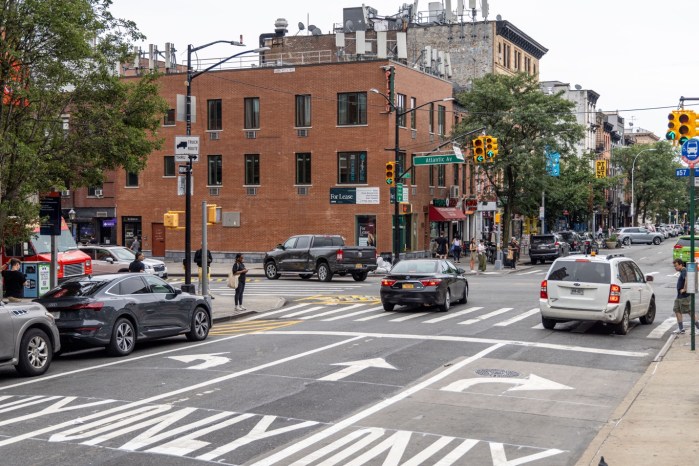The traffic lights are listening, and officials are being mum about it.
The city has quietly installed electronic devices at busy intersections that use E-ZPass technology to collect data on cars — and possibly their drivers — as they pass below, The Brooklyn Paper has learned.
The innocuous looking white boxes have been popping up on the same poles that hold traffic lights for the last few months, and are, according to the city, checking the speed and volume of traffic as it passes through thanks to the handy E-ZPass device that sticks on many Brooklynites’ windshields that allows them to breeze through tolls at area bridges and on highways.
Brooklyn Paper reporters noticed at least three different E-ZPass readers next to lights Downtown, one at the intersection of Boerum Place and Atlantic Avenue, another is at Tillary Street and the Flatbush Avenue extension, and a third on Atlantic Avenue near the Barclays Center.
The boxes aren’t limited to Brooklyn, having been installed all over the city by the Department of Transportation.
Representatives of the agency refused multiple requests by this paper to provide a list of where the tracking devices are, and no record of them appears on the agency’s website, which does list the 320 cameras it has installed on streets throughout the city to monitor traffic.
Multiple spokespeople for the Department of Transportation told us that the new devices were use to collect “aggregate data,” and that the devices weren’t being used to charge drivers with traffic violations such as speeding or running red lights.
The department runs the program independent of the E-ZPass Center that is cooperatively run by MTA Bridges and Tunnels, the Port Authority, and the New York State Thruway Authority. The agency wouldn’t say if information it collected came solely to it, or if it was shared with other agencies or any private third parties.
This newspaper requested the agency provide us with a list of locations where the devices have been installed in Brooklyn, but it failed to do so by press time.
Civil liberties advocates say they are concerned about what, exactly, the city is listening for.
“When they say that it is done for aggregate purposes, that sounds suspiciously vague,” said lawyer Norman Siegel, the former director of the New York Civil Liberties Union.
Siegel said that the E-ZPass records could wind up being used in litigation where cars and their drivers are tracked from one place to another through information gathered by the new devices. In fact, EZ-Pass technology has already been used for such a purpose, but that information was gathered while cars is pass through a toll — a moment when drivers know they’re being watched.
In the absence of more information about how the technology is being used, Siegel said, it’s difficult to tell whether or not this is an invasion of privacy.
“[Tracking technology] is a growing area for civil liberties concerns at this point,” he said.
Reach reporter Jaime Lutz at jlutz@cnglocal.com or by calling (718) 260-8310. Follow her on Twitter @jaime_lutz.
























